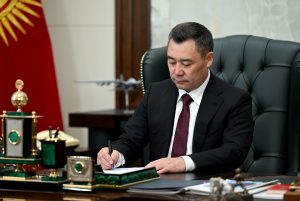Six weeks after Kyrgyzstan’s parliament adopted a new mass media law that, among other provisions, subjects all publications, including online outlets, to mandatory registration, and limits foreign ownership of media outlets, Kyrgyz President Sadyr Japarov signed the bill into law.
Japarov’s government has been working on an update to the country’s media law since at least 2022. An early draft submitted to parliament in September 2022 instigated an immediate backlash from media and human rights organizations.
In an apparent effort to achieve a palatable compromise, the Japarov administration established a working group to finalize the law in December 2022. But the working group – which included representatives from the Adilet legal clinic, as well as the founders and top editors from several notable Kyrgyz media outlets, such as 24.kg, Kaktus.media, and PolitKlinika – was barely utilized in the process of refining the draft. 24.kg reported that only two meetings were held in the first six months of 2023.
As I’ve written previously:
Meanwhile, Kyrgyzstan’s media faced escalating pressure from the government – even outlets attempting to cooperate with the government in updating the country’s media laws. A week after yet another version of the media law was submitted to parliament in early January 2024 – a draft in which very little was changed – Kyrgyz authorities raided the offices of 24.kg, briefly detaining chief editors Anton Lymar and Makhinur Niyazova. Niyazova was a member of the working group. The same day, 11 other journalists were detained.
In March 2024, Japarov’s administration withdrew the bill from parliament following a meeting between the president and more than 40 representatives of Kyrgyzstan’s media sector. The Kyrgyz president’s press secretary posted on Facebook that Japarov had listened to the media representatives and instructed that the draft law be further revised, taking into account their proposals.
By July 2024, there appeared to be in the draft law’s sixth version a compromise of sorts: mandatory registration had been replaced by voluntary registration and provisions added to require government authorities to respond to journalists in a timely manner.
Nearly a year later, when the draft was once ahead submitted to parliament, last minute amendments to the draft removed the language that made registration voluntary. The law also includes tighter restriction on foreign involvement in Kyrgyz media, barring foreigners and companies with more than 35 percent foreign participation from founding media outlets in Kyrgyzstan. Under the new law, government agencies are required to respond to journalistic inquiries within three working days, or up to 14 for more hefty requests for information.
24.kg, in outlining the new law, noted, “The law explicitly prohibits censorship and any interference by officials or founders in editorial policy, and also guarantees the right of journalists not to disclose the source of information, except in cases where this is required by the court as part of an investigation into a case.”
Mandatory registration, critics argue, is problematic because it could be easily used as an indirect weapon to control media outlets. As I’ve written previously, “Reporting on sensitive topics, including government corruption, becomes immensely more risky when a publication’s registration can be revoked at the whim of the cabinet.” This of course, would contradict the spirit of the prevision regarding censorship. But as with all laws, it’s not so much what’s written on the paper that matters, but how it is interpreted and implemented by the authorities.
The recent past, and overall trajectory of the media space in Kyrgyzstan, does not inspire great confidence. Given previous instances of state pressure on media outlets reporting on sensitive topics, there is considerable unease about how the new law could be weaponized.
In May, several current and former employees of Kloop – a long-embattled independent Kyrgyz outlet – were taken in for questioning. This week a trial began in Bishkek, with former Kloop videographers Alexander Alexandrov and Zhoomart Duulatov, as well as two accountants of the editorial office, accused of “calling for mass unrest.” A lawyer for one of the former videographers told RFE/RL, “The materials mentioned in the investigation are reports and materials by Bolot Temirov, and the defendants have no connection to them.” Nevertheless, he indicated that the defendants would plead guilty in hopes of securing lighter sentences. “As you know, the Criminal Code contains norms that if the defendants confess, they will be given a lighter sentence. They are pleading guilty to the charges on that basis.”
In the August 5 hearing, the court denied a request to release Alexandrov to house arrest and then postponed the next hearing to September 1.
In the three years it has taken for the Japarov government to see through its desired new media law, the country’s reputation as an “island of democracy” has been considerably diminished. Kyrgyzstan has been here before, with previous presidents tightening control on media and dissent only to discover that doing so does not improve the functioning of the state, or better the economy, or forestall public anger when promises made are not kept.
































